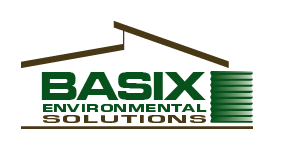Building Energy RatingsBasix Environmental Solutions provide ABSA (Association of Building Sustainability Assessors) accredited Assessors who are able to perform house energy ratings on development proposals, renovated and existing homes. Accredited House Energy Rating Assessors use computer software to rate a home by considering factors such as construction materials, window orientation and size, ventilation and insulation levels. There are three main reasons why you may need an energy rating for your house or building:
Please contact us for an obligation free quote.Complying With BASIX Greenhouse Gas Reduction RequirementsUnder BASIX, new housing in NSW must be designed and built to produce 25% less greenhouse gas emissions than average NSW homes of the same type. The target for greenhouse gas emissions will increase to 40% from 1 July 2006. One of the main components of the BASIX tool is the calculation of the cooling and heating loads required for the proposed development and the inherent ‘thermal comfort’ levels that are achieved through passive measures incorporated in the design of the building. The BASIX tool initially includes two ways to calculate thermal comfort:
The Deemed to Comply (DTC) Method can be used only for conventional building designs. It is completed by entering information about design and construction materials and does not require engagement of an Accredited Assessor. Unfortunately, compliance with this method can be quite difficult and quite restrictive. Limits are set on aspects of glazing, shading, insulation and roof colour. To use the DTC method, your proposed total glazing must be below the maximum. It cannot be used if there will be significant overshadowing or significant areas of sky windows. Put simply, the requirements of this method is normally more onerous than the Simulation Method. In the Simulation Method, the thermal performance of the building design must first be simulated in order to generate cooling and heating loads. To complete the Simulation Method, it will be necessary to engage an Accredited Assessor to conduct a thermal simulation (or energy rating) of the proposed building. The Simulation method allows much more flexibility in complying with BASIX and is suitable for a broad range of buildings. By trialling different design scenarios with the energy rating software, we can recommend design features which can raise the energy efficiency. This means considerable savings on your energy bills, a more comfortable home, and compliance with BASIX without having to make drastic design compromises. Energy Smart Homes PolicyHouse energy rating is a component of the Sustainable Energy Development Authority's (SEDA) Energy Smart Homes Policy, which is enforced by many regional Councils (outside Sydney) until July 2005, when it will be superseded by the requirements of BASIX. The overall policy, which includes energy efficient hot water systems, lighting, appliances, as well as housing, encourages reduction of energy consumption in the home and therefore reduced greenhouse gas emissions, at the same time making the home more comfortable. Many Councils in NSW have introduced a mandatory energy rating for all new dwellings, additions and alterations. Under the framework of the Energy Smart Homes Policy, accredited House Energy Rating (HER) Assessors use computer software to rate the home. The home is assessed by considering factors such as construction materials, window orientation and size, ventilation and insulation levels. On a scale of 0 to 5 stars, a 5 star rating means a thermally comfortable house that minimises the need for heating in winter and cooling in summer, improving your comfort. In areas where Councils have implemented a house energy policy, 3.5 stars will be the minimum a house is allowed to achieve to obtain a development approval and is a compromise between significant energy savings and recognition that other issues are important to homebuyers. Savings up to 40% of energy bills should be possible in most houses by reducing artificial heating and cooling. If a house rates lower than 3.5 stars, an ABSA Accredited House Energy Rating Assessor is able to recommend design features which can raise the energy efficiency and thus, the star rating of the home. This means considerable savings on your energy bills, and a more comfortable home. To see if your Council has adopted the Energy Smart Homes Policy. Good Reasons To Energy Rate Your HomeDid we mention savings up to 40% of energy bills should be possible in most houses by reducing artificial heating and cooling? ABSA Accredited Energy Rating Assessors undergo training, and all must pass an exam before they can be accredited, and their work is audited regularly, so home owners and buyers can confidently obtain accurate information regarding heating and cooling requirements of their particular house. Additionally, the seller can obtain a marketing edge and achieve greater resale value by advertising a home as being one which is energy efficient. When a house built today is sold in only a few years time it will have to compete with houses that are very energy efficient due to increasing awareness of the need to conserve energy and increasing State Government requirements. For example, BASIX requires new housing in NSW must be designed and built to produce 25% less greenhouse gas emissions than average NSW homes of the same type. The target for greenhouse gas emissions will increase to 40% from 1 July 2006. Already in the ACT all houses sold and rented or leased must have a rating provided to prospective buyers and renters, irrespective of the age of the house. House energy rating aims to make everyone a winner - the home buyer, the home seller, and above all, the environment. Basix Environmental Solutions has ABSA Accredited Assessors who are able to perform house energy ratings on development proposals, renovated and existing homes. Please contact us for an obligation free quote. |
 |
 |
|
|
|
|
|
|